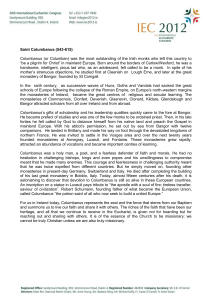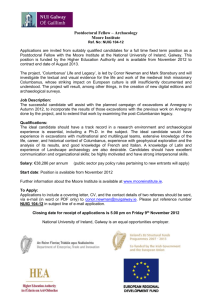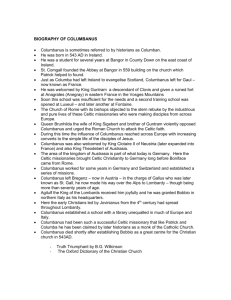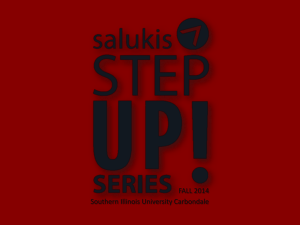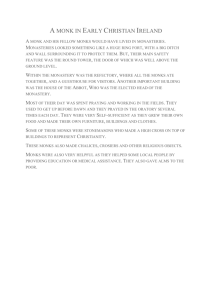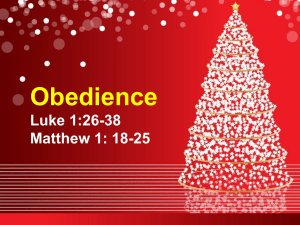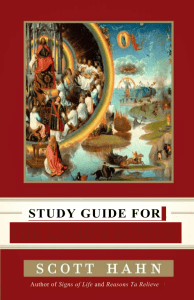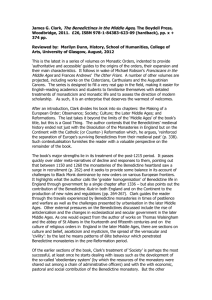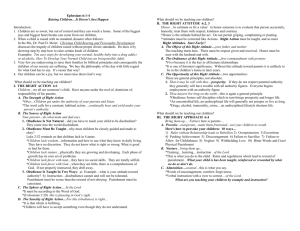E-SOURCE 6.3 The Rule of Columbanus vs. the Rule of Benedict St
advertisement
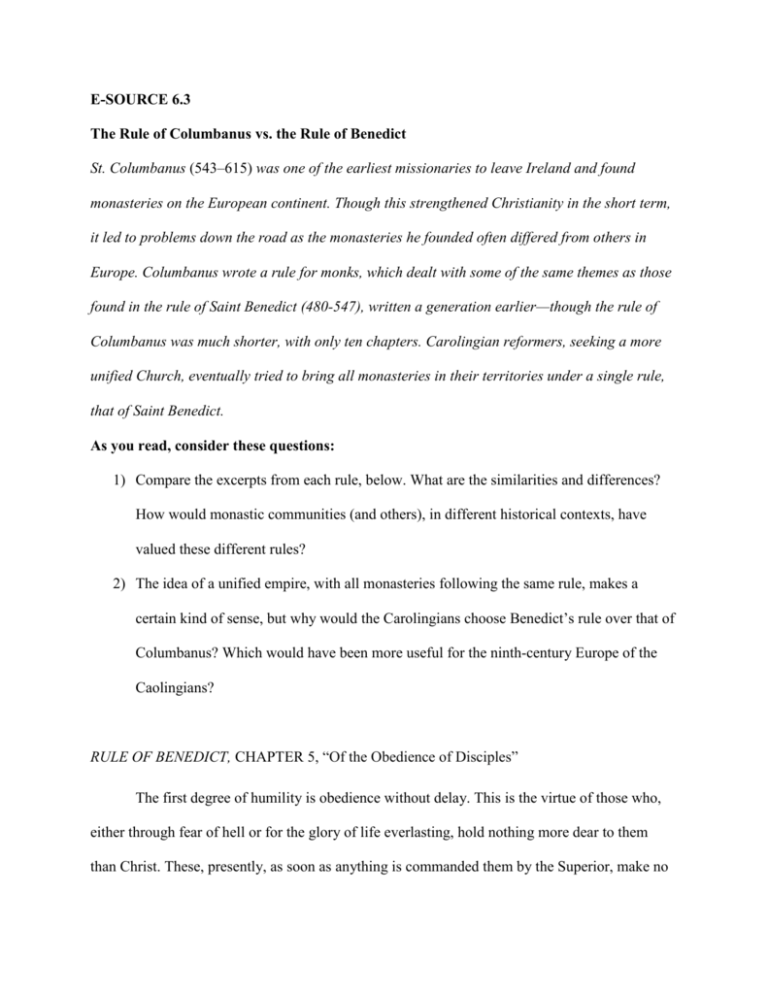
E-SOURCE 6.3 The Rule of Columbanus vs. the Rule of Benedict St. Columbanus (543–615) was one of the earliest missionaries to leave Ireland and found monasteries on the European continent. Though this strengthened Christianity in the short term, it led to problems down the road as the monasteries he founded often differed from others in Europe. Columbanus wrote a rule for monks, which dealt with some of the same themes as those found in the rule of Saint Benedict (480-547), written a generation earlier—though the rule of Columbanus was much shorter, with only ten chapters. Carolingian reformers, seeking a more unified Church, eventually tried to bring all monasteries in their territories under a single rule, that of Saint Benedict. As you read, consider these questions: 1) Compare the excerpts from each rule, below. What are the similarities and differences? How would monastic communities (and others), in different historical contexts, have valued these different rules? 2) The idea of a unified empire, with all monasteries following the same rule, makes a certain kind of sense, but why would the Carolingians choose Benedict’s rule over that of Columbanus? Which would have been more useful for the ninth-century Europe of the Caolingians? RULE OF BENEDICT, CHAPTER 5, “Of the Obedience of Disciples” The first degree of humility is obedience without delay. This is the virtue of those who, either through fear of hell or for the glory of life everlasting, hold nothing more dear to them than Christ. These, presently, as soon as anything is commanded them by the Superior, make no delay in doing it, just as if the command had come from God. Of such, our Lord says, “As soon as he heard, he obeyed Me" [Ps. 17(18]):45]. And to superiors and teachers He says, “He who hears you, hears Me” [Luke 10:16]. Therefore, such as these, immediately leaving presently all their occupations, and forsaking their own will, leave unfinished what they were about, and with the speedy foot of obedience follow by deeds the voice of him who commands. And thus, as it were at the same moment the command of the master and the perfect work disciple with the fear of God, go both jointly together, and are speedily effected by those who search after life everlasting. These take the narrow way, of which the Lord says, “Narrow is the way that leads to life” [Matt. 7:14] They live not according to their own will, nor follow their own desires and pleasures, but abiding in monasteries, they will to have an Abbot over them, and walk according to his command and direction. Without doubt these fulfill that saying of our Lord: “I came not to do my own will, but the will of Him who sent Me” [John 6:38]. This obedience will then be acceptable to God and pleasing to men, only if what is commanded is not done fearfully, slowly, coldly, or with murmuring, or an answer showing unwillingness; because the obedience which given to superiors is given to God, Who has said, “He who hears you, hears Me” [Luke 10:16]. Hence it ought to be done by the disciples with a good will, because “God loves a cheerful giver” [2 Cor. 9:7]. If the disciple obeys with an ill will and murmurs, not only in words, but also in heart, although he fulfill what is commanded of him, it will not be acceptable to God, who sees the heart of murmurer. For such a work he will not have any reward, but will incur the penalty of murmurers, unless he amend and make satisfaction. RULE OF ST. COLUMBANUS, CHAPTER 1, “Concerning Obedience” At the first word of a superior all must rise to obey, because by obeying him they obey God, according to the word of the Lord Jesus: “He that heareth you, heareth me”. If, therefore, anyone hearing a word of command does not rise straightway he shall be adjudged disobedient. Whoever contradicts incurs the crime of contumacy [stubbornness]; he is not only guilty of disobedience but by opening the gateway of refractoriness to others he becomes the seducer of many. If anyone obeys with grumbling, his obedience, not coming from the heart, is disobedience: therefore, until he shows his good will, his work is of no avail. To what limits should obedience be carried? Obedience unto death is certainly enjoined on us, because Christ was obedient to His Father for us unto death. “Let this mind be in you,” says the Apostle [Paul], “which was also in Christ Jesus: who being in the form of God, thought it not robbery to be equal with God, but emptied Himself, taking the form of a servant, being made in the likeness of men, and in habit found as a man. He humbled Himself, becoming obedient (to His Father) unto death, even to the death of the cross.” The true disciple of Christ must obey in all things; no matter how hard or distasteful the task laid upon him may be, he must set about its fulfillment with zeal and joy, because only such obedience is acceptable to the Lord, who says: “He that does not take up his cross, and follow Me, is not worthy of Me”. Wherefore also He says of the disciple worthy of Him: “Where I am, there also shall My minister be with Me.” RULE OF BENEDICT, CHAPTER 6, “Of Silence” Let us act in accordance with the saying of the Prophet: “I have said: I will keep my ways, that I offend not with my tongue; I held my peace and humbled myself, and was silent from speaking even good things” [Ps. 38[39]:2-3]. If therefore, according to this saying of the Prophet we are at times to abstain, for silence sake, even from good talk, so much the ought we refrain from evil words, on account of the guilt and penalty from sin! Therefore, because of the importance of silence, let permission to speak be seldom given, even to perfect disciples, although their words be of good and holy matters, tending to edification; because it is written, “In much speaking, thou shalt not escape sin” [Prov. 10:19]. And in another place, “Death and life are in the hands of the tongue” [Prov. 18:21]. For it behooves a master to speak and teach; and it behooves a disciple to hold his peace and to listen. If therefore, anything must be asked of the Prior, it should be done with all humility, subjection, and reverence, that he who asks may not appear to speak more than is necessary. But as for buffoonery, and idle words, or such as move to laughter, we utterly condemn and forbid them in all places, not do we allow a disciple to open his mouth to give them utterance. RULE OF ST. COLUMBANUS, CHAPTER 2, “Concerning Silence” Rule of silence must be diligently observed, for it is written: “The service of justice shall be quietness and peace”. All superfluity of words must be avoided; except in cases of necessity or utility, the monk must be silent, because, according to the Scripture, “in the multitude of words there shall not want sin.” Hence our Saviour says: “By thy words thou shalt be justified, and by thy words thou shalt be condemned.” Justly indeed shall they be condemned who would not, though able, speak just words, but preferred in their garrulousness to speak wicked, unjust, ungodly, vain, injurious, double-meaning, false, quarrelsome, abusive, shameful, absurd, blasphemous, harsh, and crooked words. These and such like words must never pass the lips of the monk, whose tongue must ever be governed by prudence and right reason, lest by his talkativeness he be betrayed into detractions and contradictions born of pride. RULE OF BENEDICT, CHAPTER 39, “On the Measure or Quantity of Food” We think it sufficient for daily refection [dinner], both at the sixth or the ninth hour, that there be at all seasons two dishes, because of the infirmities of different people, so that he who cannot eat of the one may make his meal of the other. Let therefore let two dishes of hot food suffice for the Brethren; and if any apples or fresh vegetables, let them be added as a third dish. Let one pound weight of bread suffice for the day, whether there be one refection, or both dinner and supper. If they are to have supper, let a third of that pound be reserved by the Cellarer, to be given them at supper. If their labour be great, it shall be in the power of the Abbott to add what he shall think fitting to their ordinary allowance; taking care always to avoid excess and surfeiting, that the monks be not overtaken with indigestion, because there is no sin more contrary to the Christian than gluttony; as Our Lord says, “Take heed lest your hearts be overcharged with surfeiting and drunkenness” [Luke 21:34]. But to children of tender age, let not the same quantity be given, but less than that to the older, in all things preserving moderation and frugality. Let all, except the weak and the sick, abstain from eating the flesh of four-footed beasts. RULE OF BENEDICT, CHAPTER 40, “On the Measure of Drink” Everyone has his own gift from God, one thus, and another thus” [1 Cor. 7:7]. Therefore, it is not without some misgiving, that we appoint the measure of other men’s sustenance. Yet, considering the condition of those in weak health, we think that one pint of wine will be sufficient for each one every day. But those to whom God bestows the gift of abstinence know, that they shall receive their proper reward. If, however, the situation of the place, extraordinary labour, or the heat of summer, require more, let the Prior do what he thinks good, taking care always that fullness or gluttony do not creep in. And although we read “that wine is in no way a drink for Monks”; yet, because in these our times, they will not be so persuaded, let us at least agree to this, not to drink to satiety, but sparingly, because “wine makes even the wise fall away” [Eccles. 19:2]. Where, however, the poverty of the place will not allow the appointed measure, but much less or none at all, let those who live there praise God and murmur not. This we admonish above all things, that there never be any murmuring. RULE OF ST. COLUMBANUS, CHAPTER 3, “Concerning Food and Drink” The food of the monks shall be coarse, consisting of cabbage, vegetables, flour mixed with water, and a biscuit, and taken toward evening. Surfeiting [consuming to excess] must be guarded against in eating, and drunkenness in drinking, so that what is partaken may sustain, not injure, the body, for by overloading the stomach the mind becomes stupid. Those who look out for the eternal reward should satisfy only their real needs in this life. True discretion requires that food and work shall be duly proportioned. It is reasonable to promote spiritual progress ·by bringing the flesh into subjection by abstinence, but if abstinence is practiced to excess, it ceases to be a virtue and becomes a vice. Hence the monk must fast daily, but also daily refresh his body with food; since he must indulge his body, he must do so sparingly and by means of the coarsest food; for only to this end does he eat daily that he may be able to make daily progress in virtue, pray daily, work daily, and read daily. Source: Source: The Rule of Our Most Holy Father St. Benedict, Patriarch of Monks, from the Old English edition of 1638, edited in Latin and English by one of the Benedictine Fathers of St. Michael’s, near Hereford (London, 1875), pp. 47-55; and George Metlake, The Life and Writings of Saint Columban (Philadelphia: The Dolphin Press, 1914), 71-76. Text modified by Phillip C. Adamo.
